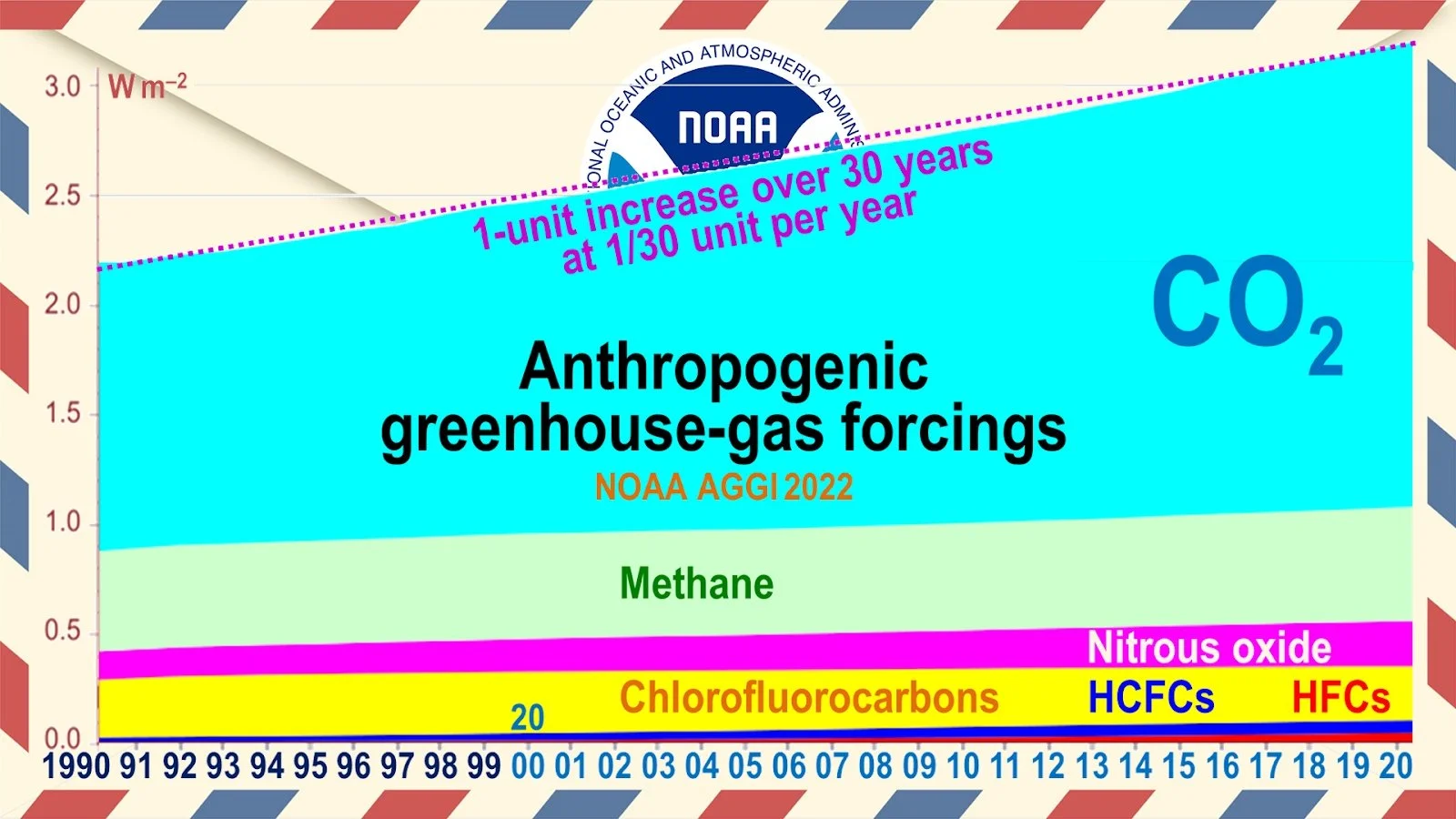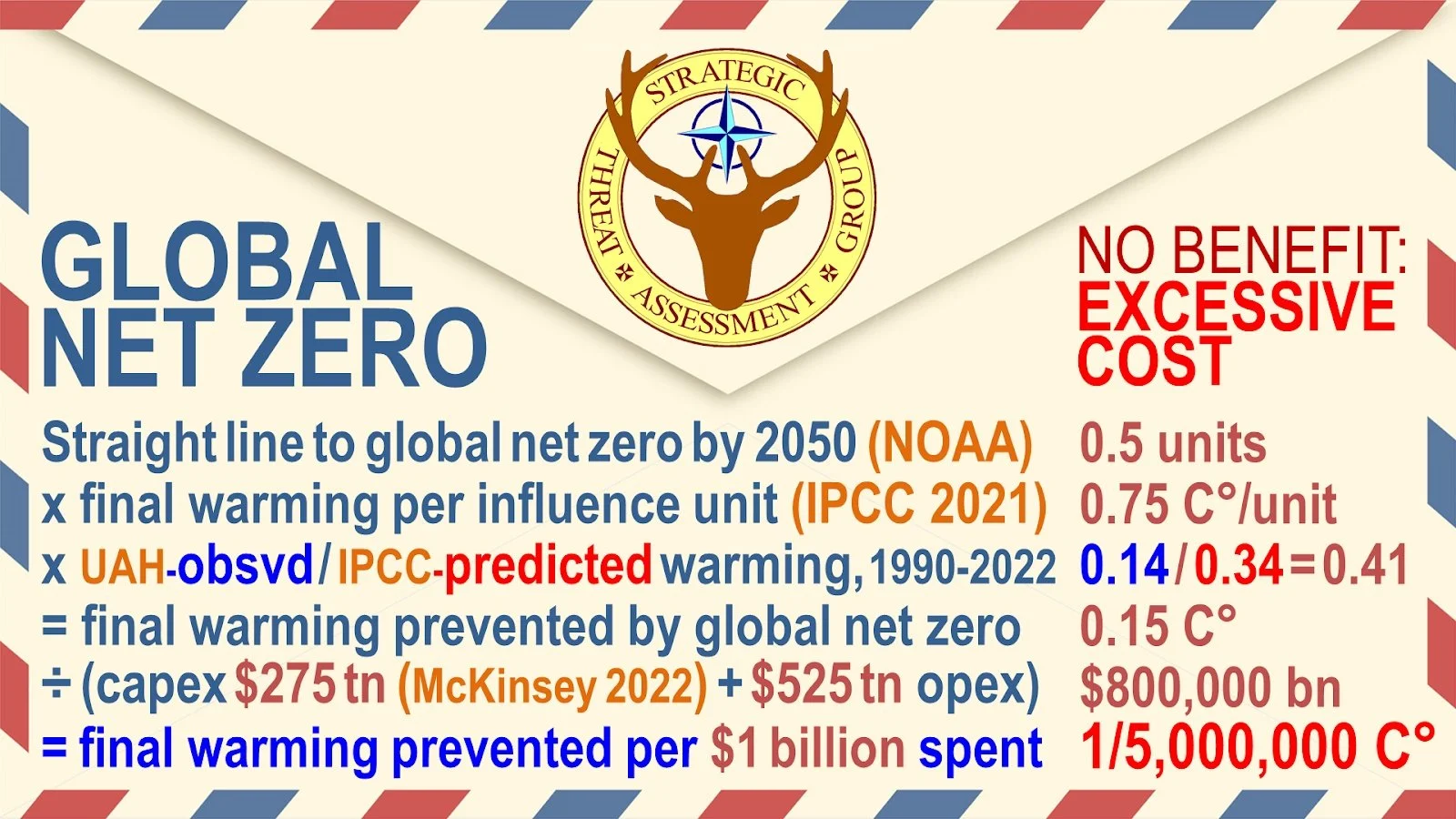Beyond Brexit: NetExit | Christopher Monckton
The climate King, a true-believer in the global-warming narrative, is no doubt delighted that Mr Sunak, on his first day as Prime Minister, reinstated the Johnson ban on
fracking Britain’s valuable reserves of shale gas. His Majesty believes global warming will be a catastrophe unless the West, and only the West (the rest being Paris-exempt),
attains net zero emissions. He believes net zero would make a measurable difference to the climate. He believes net zero is affordable. And there are fairies at the bottom of
the garden – the flowers tell him so.
A thousand years ago, King Canute was by contrast the wisest ruler we ever had. When his courtiers, just like today’s, acted au-dessus de sa gare and imagined that just
because they were in office they could do as they pleased, the King had his throne set up on the sea shore, gathered his ministers round him, stretched forth his hand
towards the ocean and, to their astonishment, commanded sea level not to rise and the tide not to come in.
Sea level paid no attention, of course. The tide came in just as usual, and perpetrated the lèse-majesté of soaking the Royal tootsies. The King turned to his courtiers and
said: “If even I, your divinely-anointed King, cannot command these little wavelets, know ye that ye also are not omnipotent. Give all praise, then, not to Us but to Him in
Whom alone all power resides.”
Today’s Danes, duller than Canute, are paying “climate reparations” to developing countries. The Swedes, however, have woken up and smelt the coffee. They have swept
away their entire “Environment Ministry” and are dashing to build enough coal-fired power stations to keep the lights on permanently, reliably and, above all, affordably.
Time for us to do the same.
Even the Germans, having put themselves fatally in hock to the Kremlin and its supplies of now-overpriced Siberian gas by shutting down their coal and nuclear stations, are
beginning to think again. When President Trump, in a characteristically prescient address to the United Nations, warned Germany that it would come to rue its abject
dependence upon Communist gas, the German delegation were filmed smirking and sniggering. They are not sniggering now. Arcelor Mittal has announced that it is
shuttering its blast furnaces in Bremen and Hamburg because electricity is now unaffordable. The lights are going out all over Europe.
The cost of energy is crippling our economy too. For 30 years, governments have made fuel and power ever more expensive by shutting down the clean, reliable coal-fired
power stations that once gave us some of the cheapest electricity in the world. Our industries now use less electricity than 70 years ago, for government climate-change
policies have priced out most of our energy-intensive businesses, such as steel and aluminium smelting, leaving many of our working people jobless and our once-great
nation at the mercy of hostile foreign powers.
Yet, even if warmer worldwide weather were a problem rather than a net benefit (it is cold that is the real killer), there is no point in trying for net zero. NOAA’s graph of the
annual greenhouse-gas index (below) shows that, in the 30 years 1990-2020, the influence of all nations on global temperature has grown in a straight line by just 1 unit, at
almost exactly a thirtieth of a unit a year. There has been no change in the rate of increase in all nations’ effect on temperature. Trillions spent, nothing gained. Why do our
King and our classe politique imagine that squandering yet more trillions of other people’s money will make any difference?
A simple enough graph… Simple enough for the back of an envelope.
The world cannot and will not attain net zero emissions, not least because 70% of new primary-emissions growth in recent years has arisen in Paris-exempt “developing”
countries such as China and India, each of which has its own space programme.
Even if – per impossibile – the whole world were to move in a straight line from 2020 to net-zero emissions by 2050, just half the next unit of our influence on global
climate would be abated. According to IPCC, at midrange each unit represents just three-quarters of a Celsius degree. So only three-eighths of a Celsius degree of future
warming would be prevented. In reality, however, in the 32 years since 1990 the world has warmed at well below half IPCC’s midrange predicted rate. So IPCC’s three-
eighths of a degree prevented by global net zero becomes less than a sixth of a degree.
And what of the cost of achieving that infinitesimal cut in future warming? According to McKinseys, the leading international consultancy, global net zero would cost £275
trillion in capital spending alone. Multiply that by at least three to take account of operational spending as well. Global net zero will cost at least $800 trillion. Each $1
billion spent on global net zero would thus prevent less than one five-millionth of a degree of future global warming. This first-order benefit-cost calculation is so simple
that it fits on the back of an envelope –
Again, all that is required is an envelope, a pen and a few statistics…
You can do these step-by-step calculations on an abacus. They are derived entirely from mainstream sources, methods and midrange data. Shown recently to leading hedge-
fund managers, investors and government personnel at the Dorchester Hotel, London, they caused consternation. None, when asked, raised a hand to say net zero would be
value for money.
The true position is even less favourable to the global warming narrative than that first-order appraisal shows. For only the West is even trying to get to net zero. If it did,
not a sixth but little more than a twentieth of a degree of global warming would be prevented by 2050. However, even the West cannot and will not get to net zero. There are
nothing like enough techno-metals to achieve it. As they become scarcer, they will become costlier. Realistically, the West could prevent only a fiftieth of a degree of
warming by 2050, if that, and only then at flagrantly disproportionate cost – the worst value for money in the history of economics.
The hedgies at the Dorch were gobsmacked because, on seeing the benefit-cost appraisal, they realized that our political parties have naively signed up to net zero without
bothering to count the cost at all. Indeed, the nest of profiteering vipers known as the “Climate Change Committee” has refused to produce any proper benefit-cost appraisal,
because it knows (but dare not admit) that the Strategic Threat Assessment Group’s calculations are correct.
Neither the pandemic nor the special military massacre in Ukraine is the root cause of Britain’s bankruptcy. It is our politicians’ fear of the reputational assassination that
the agents of certain hostile powers, and the useful idiots they manipulate, direct at anyone who dares to challenge the Party Line on global warming that has deterred them
from doing the math.
The blackouts now promised by our grid authority during cold nights this winter will perhaps bring us to our senses. Sweden got there first, but we will follow. Already, there
are stirrings and circlings outside the corridors of impotence. FairFuel UK, which rightly opposes the Johnson ban on all new real cars powered by petrol or diesel in 2030,
already has 1.7 million supporters – ten times the membership of the Conservative Party.
A new party whose chief policy was Netexit – cancel the ban on real cars, unban fracking, build a dozen coal-fired and half a dozen nuclear power stations – would be even
more popular and influential than UKIP was. The mainstream parties, by their inability to work out how many beans make five, are marginalizing themselves. Britain is
open to a people’s coup.
From its HQ at St James’s Park underground station, the Office for Budget Responsibility, realizing that the net-zero sums don’t work, is pointing out to the Chancellor that
if he wants to balance the budget and set Britain free all he has to do is face down the climate King, his louche, etiolated, apolaustic Parliament and the screaming, hate-
filled, Kremlin-funded, anti-capitalist glue-gobbers, defund the Climate Change Committee crooks, pull Britain out of IPCC and UNIPCC, cancel the current £50 billion a
year in climate-change subsidies, make the Truss tax cuts instead, cancel the climate-biased BBC’s poll tax of a licence fee, end the media’s and internet giants’ suppression
of free speech on climate and other issues, get the lights back on and let our nation compete again.
Nigel Farage is said to be quietly raising funds for a new party – not Brexit this time, but Netexit. Climate sceptics have also spoken at the recent Reform Party Conference.
Jeremy Clarkson would be a useful ally to the new party, and – such is the damage caused by climate policy to all industries – there is no shortage of potential funders. The
clans are gathering.
As with Brexit, so with Netexit, the Conservatives – the chief architects of the economically illiterate climate-change policies that have flung Britain into debt, inflation and
bankruptcy – have the most to lose from a new party devoted to ending the climate scam.
When I was deputy leader of UKIP, we carried out a poll to find out what issues, other than freedom from the Brussels tyranny-by-clerk, would be most likely to win us
votes. Root and branch opposition to the entire global-warming nonsense came top by a country mile.
The Tories are already polling at rock bottom. If the new party gets its boots on, and if Mr Sunak and his cabinet of none of the talents continue to pay no heed to economic,
scientific and political reality, he could be the last Conservative prime minister ever. We, the people, have had enough.



